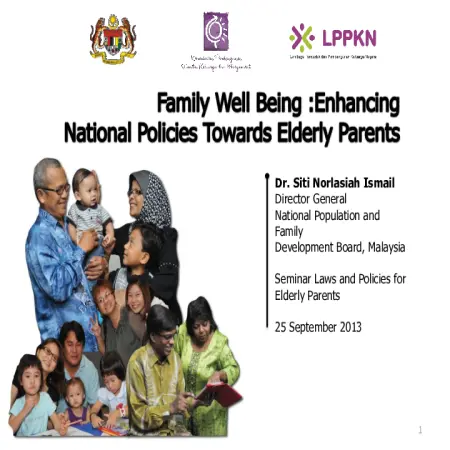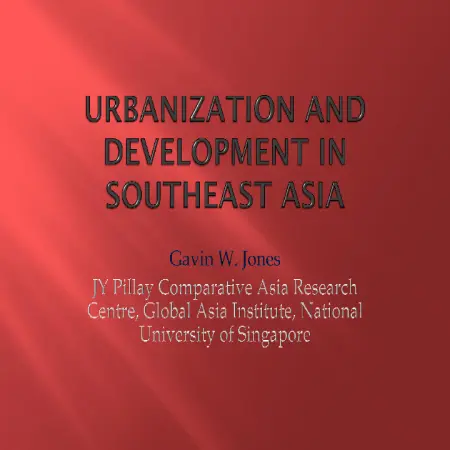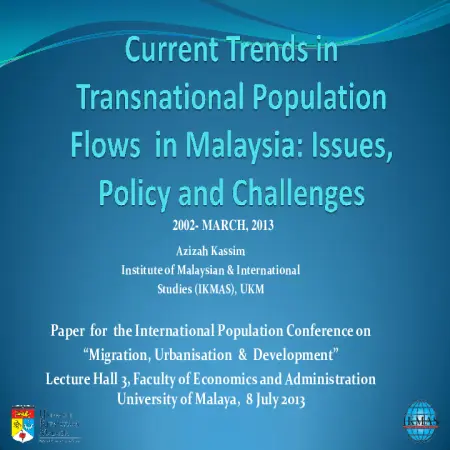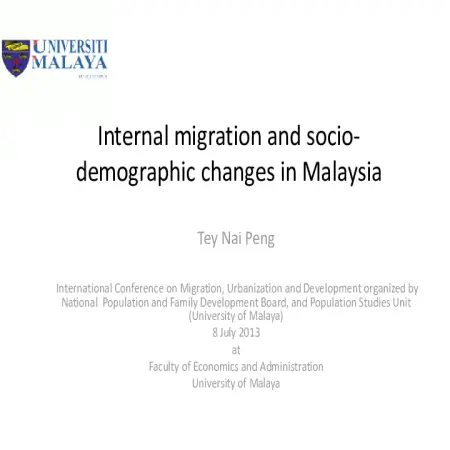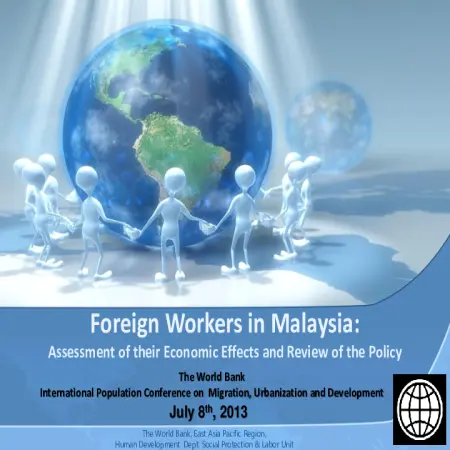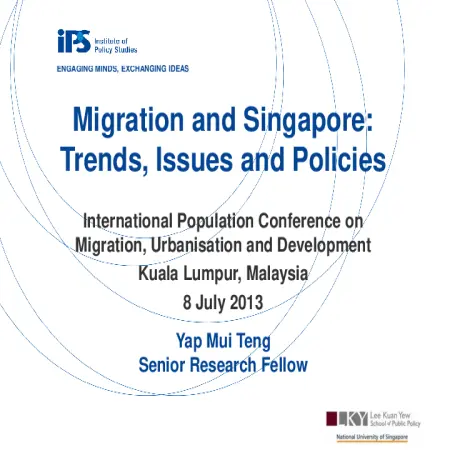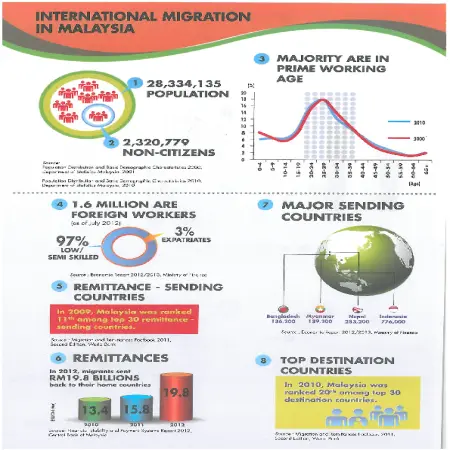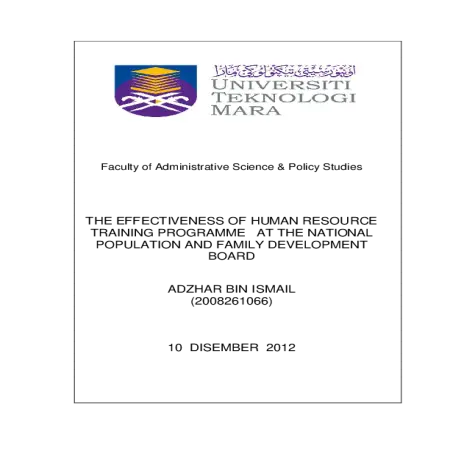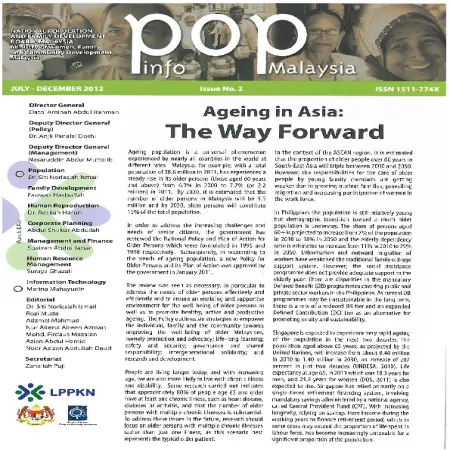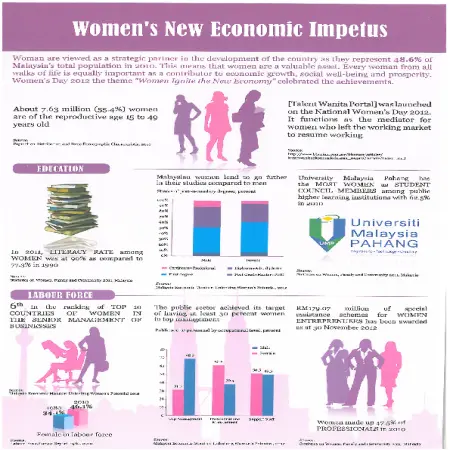TOPICS
|
|
Family well being: enhancing National Policies towards elderly parents
Item Type: Conference or Workshop Item
Editor:
Year: 00/00/2013
Abstract: Malaysia will be aged by the year 2030. The objective of National Policy for Older Persons, 2011 is to enhance the respect for and self-worth of the elderly in family, society and nation, to develop the potential of the elderly so that they remain active and productive in national development and to create opportunities for them to continue to live independently and to encourage the establishment and the provision of specific facilities to ensure the care and protection of the elderly.
|
|
|
|
|
|
Current trends in transnational population flows in Malaysia: Issues, policy and challenges
Item Type: Conference or Workshop Item
Editor:
Year: 00/00/2013
Abstract: In the last 40 years there has seen a substantial increase in Malaysia’s foreign pop. According to the last National Census in 2010, out of a pop of 28.4 million, over 8.3% are non-citizens. The increase is mainly the result of labour inflow since the early 1970s due to Malaysia’s relatively better economic development and political stability which attract economic migrants and asylum seekers from within and outside the ASEAN region. This paper which focuses on current transnational flows in the country has the following objectives: 1. To provide an overview of transnational population flows in Malaysia in the last decade and identify major streams that are causing considerable concern to the state and the Malaysian public. The focus is on the low skill foreign workers, the largest category of migrants in Malaysia. 2. To examine public perceptions of foreign workers, how such perceptions are formed and what their impacts are on state policy. 3. To discuss the state policy on foreign workers, both legal and irregular, the objective of the policy and its strategies. 4. To highlight the challenges faced by the state in implementing the foreign worker policy. 5. To evaluate the achievement and shortcomings of the policy. The writer identifies five types of transnational inflows into Malaysia i.e. that of low skill migrant workers both legal and irregular; asylum seekers; expatriates; foreign students; and participants of Malaysia’s My Second Home (MM2H) project.
|
|
|
|
|
|
Internal migration and socio-demographic changes in Malaysia
Item Type: Conference or Workshop Item
Editor:
Year: 00/00/2013
Abstract: This paper re-examines the levels, trends and patterns of internal migration, followed by some discussions on the causes and consequences of internal migration in Malaysia in 1991 and 2000. A more up to date analysis awaits the release of migration data from the 2010 census. The focus of this paper is on inter-state and inter-regional rather than intra-state migration as more people moved across states than within state. Key questions to be addressed include the reasons for the high concentration of migration in the Klang Valley since the 1970s, migration selectivity in terms of age, education and ethnicity. The migration impact on socio-demographic changes and policy issues will also be examined.
|
|
|
|
|
|
Foreign workers in Malaysia: assessment of their economic effects and review of the policy
Item Type: Conference or Workshop Item
Editor:
Year: 00/00/2013
Abstract: This study aims to help Ministry of Human Resource to better manage existing human resources in the country and to plan for the development of future human capital needs.
|
|
|
|
|
|
The effectiveness of human resource training programme at the National Population and Family Development Board
Item Type: Thesis
Editor:
Year: 10/12/2012
Abstract: Training is a part of human basic needs to achieve perfects or efficiency in doing task. In the public service, training is a must for everyone in order to enhance their skills, knowledge and attitude. This study is to find out the effectiveness of Human Resource Training Policy. The study was done at the National Population and Family Development Board (NPFDB), one of the Government agency under a Ministry of Women, Family and Community Development. The data is collected through distributed questionnaire among the officers and staffs at NPFDB. The questionnaire is divided into 3 part consists respondent profile, effectiveness of training program (13 question) and employee attitude towards training (13 question) and ended with comment or suggestion from respondent if any. Secondary data also is used provided by the Human Resource Department, NPFDB. Quantitative analysis is carried out on this data and standard SPSS (version 18.0) is used to run the analysis. Descriptive statistic is used to analyse respondent's profile. The study shows that independent variable are negative significant with dependent variable. The perception and perceived outcome of the study point that the human resource training policy is significant and acceptable.
|
|
|
|
|
|
Ageing in Asia: the way forward
Item Type: Newsletter
Editor:
Year: 00/12/2012
Abstract: Ageing population is a universal phenomenon experienced by nearly all countries in the world at different rates. Malaysia, for example with a total population of 28.6 million in 2011, has experienced a steady rise in its older persons (those aged 60 years and above) from 6.3 % in 2000 to 7.7 % (or 2.2 million) in 2011. By 2020, it is estimated that the number of older persons in Malaysia will be 5.5 million and by 2030, older persons will constitute 15 % of the total population.
|
|
|
|
|
|
Women's new economic impetus
Item Type: Infographic
Editor:
Year: 00/12/2012
Abstract: Women are viewed as strategic partner in the development of the country as they represent 48.6% of Malaysia's total population in 2010. This means that women are a valuable asset. Every woman from all walks of life is equally important as a contributor to economic growth, social well-being and prosperity.
|
|
|
|





